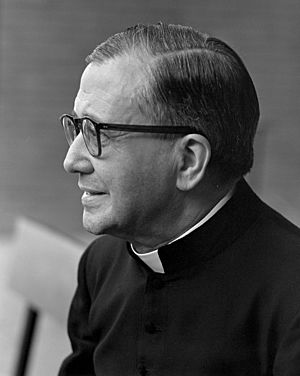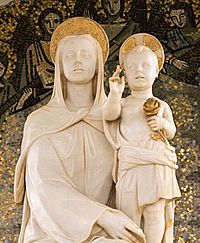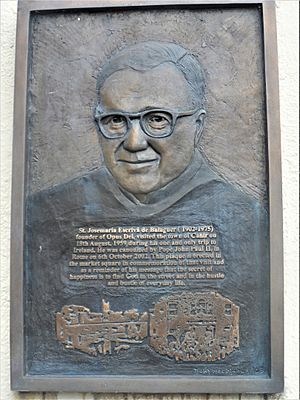Josemaría Escrivá facts for kids
Quick facts for kids SaintJosemaría Escrivá |
|
|---|---|
 |
|
| Priest and Saint of Ordinary Life | |
| Born | 9 January 1902 Barbastro, Spain |
| Died | 26 June 1975 (aged 73) Rome, Italy |
| Venerated in | Roman Catholic Church |
| Beatified | 17 May 1992, Saint Peter's Square, Vatican City by Pope John Paul II |
| Canonized | 6 October 2002, Saint Peter's Square, Vatican City by Pope John Paul II |
| Major shrine | Our Lady of Peace, Prelatic Church of Opus Dei, Rome, Italy |
| Feast | 26 June |
| Attributes | Priest attire Rosary |
| Patronage | Opus Dei People with diabetes |
Josemaría Escrivá de Balaguer y Albás (born January 9, 1902 – died June 26, 1975) was a Spanish Catholic priest. He started an organization called Opus Dei. This group helps everyday people and priests find holiness in their normal lives. They believe that God calls everyone to be holy.
In 2002, Pope John Paul II declared Josemaría a saint. The Pope said that Josemaría should be seen as one of the "great witnesses of Christianity."
Escrivá studied civil law and theology (the study of religious faith) at universities. His main work was starting and growing Opus Dei. His most famous book is The Way. It has been translated into 43 languages and sold millions of copies.
Many Catholic leaders have supported Escrivá's ideas. These ideas include the belief that everyone is called to be holy. They also supported the important role of regular people in the Church. And they liked the idea that everyday work can help you become holy.
Contents
Biography
Early Life and Becoming a Priest
Josemaría Escrivá was born on January 9, 1902. His hometown was Barbastro, in Huesca, Spain. He was the second of six children. His father was a merchant. His family moved to Logroño in 1915 after his father's business failed.
Josemaría felt a special calling when he was young. He saw footprints in the snow left by a monk walking barefoot. This made him think God had chosen him for something important.
With his father's support, Josemaría decided to become a priest. He studied in Logroño and then in Zaragoza. He became a deacon on December 20, 1924. He was ordained a priest in Zaragoza on March 28, 1925. After working in a small church, he moved to Madrid in 1927. There, he studied law at the Central University. He also worked as a private tutor and a chaplain (a priest for a specific group) at a convent and school.
Founding Opus Dei
Josemaría spent time in prayer. On October 2, 1928, he felt he understood God's plan for him. He "saw" Opus Dei, which means "Work of God" in Latin. It was a way for Catholics to become holy through their daily work. He officially founded it in 1928. The Pope approved it in 1950.
The Church says that Josemaría gave himself completely to this mission. He worked with all kinds of people. He especially helped the poor and sick in Madrid's slums and hospitals.
During the Spanish Civil War, Josemaría had to leave Madrid. He went to Burgos, where General Francisco Franco's forces were based. After the war ended in 1939, Josemaría finished his law studies in Madrid.
In 1943, he started the Priestly Society of the Holy Cross. This group is connected to Opus Dei. Josemaría moved to Rome in 1946. He worked tirelessly to help Opus Dei grow around the world. He encouraged many people to become priests and religious. He also started many projects to help people and spread the Christian message.
Later Years and Legacy
When Josemaría was two years old, he was very sick. Doctors thought he might die. But his mother took him to Torreciudad, a place where people honored the Virgin Mary. Josemaría got better. Later, as the head of Opus Dei, he helped build a large shrine at Torreciudad. This shrine opened in 1975, shortly after his death. It is now a major pilgrimage site for Opus Dei members.
By the time Josemaría died in 1975, Opus Dei had about 60,000 members in 80 countries. As an adult, Josemaría had type 1 diabetes.
In 1950, Pope Pius XII gave Escrivá the title of Monsignor. In 1955, he earned another doctorate in theology. He also advised two Vatican groups. The Second Vatican Council (1962–65) later confirmed many of his ideas. These included the importance of everyone being called to holiness. It also stressed the role of regular people and the Mass in Christian life.
In Rome, Escrivá founded two educational centers for Opus Dei members. He also helped start the University of Navarre in Spain and the University of Piura in Peru. These are regular universities connected to Opus Dei. Josemaría died of a heart attack on June 26, 1975, at age 73.
Three years after his death, Cardinal Albino Luciani (who later became Pope John Paul I) praised Josemaría's unique contribution to Christian spirituality.
Personality and Beliefs
General Attitudes
Bishop Leopoldo Eijo y Garay of Madrid knew Escrivá well. He described Escrivá as energetic and organized. He also said Escrivá was very obedient to the Church. The bishop noted Escrivá's strong love for the Church and the Pope.
Viktor Frankl, a famous psychiatrist, met Escrivá in 1970. He wrote about Escrivá's "refreshing serenity" and his ability to connect with people. Frankl felt that Escrivá lived fully in the present moment.
Álvaro del Portillo, Escrivá's close helper, said Escrivá's main quality was his dedication to God. He was always ready to follow God's will. Pope Paul VI called Escrivá's holiness "extraordinary." He said Escrivá received many special gifts from God and used them generously.
Journalist John L. Allen Jr. watched videos of Escrivá. He noted Escrivá's lively personality and good sense of humor. Escrivá often joked and made people laugh.
Some people who knew Escrivá had different views. Architect Miguel Fisac, an early Opus Dei member, described Escrivá as pious but also vain and secretive. He claimed Escrivá sometimes showed a violent temper. British journalist Giles Tremlett noted that biographies of Escrivá show very different pictures of him.
Beliefs About God
Prayer
Cardinal Ratzinger (who became Pope Benedict XVI) was impressed by Escrivá's explanation of "Opus Dei." Escrivá knew he had to start something, but he felt it wasn't his own work. He believed God was using him. So, it was "God's Work." This shows he was always talking with God.
Pope John Paul II called Escrivá a "master in the practice of prayer." He saw prayer as a powerful "weapon" to improve the world. The Pope said that helping others comes mostly from prayer and a strong sacramental life.
John Paul II also said Escrivá's life could be seen through five short prayers. These prayers showed his deep desire to do God's will. They also showed his loyalty to the Church and his love for Mary. He wanted Christ to rule in everyone's hearts. And he wanted all glory to go to God.
John Paul II said that Escrivá had an amazing love for God's will. He lived only to fulfill God's plan. Escrivá was chosen to teach that everyone is called to be holy. He showed that daily life and ordinary tasks are a path to holiness.
Some people, like theologian Hans Urs von Balthasar, did not think Escrivá's book The Way offered enough spiritual depth. He called it "a little Spanish manual for advanced Boy Scouts."
Liturgy
Escrivá saw the Mass as the most important part of a Christian's life. This idea was later used by the Second Vatican Council. Escrivá always tried to follow the rules for celebrating Mass. He made sure Opus Dei followed the new rules from Vatican II.
He found it hard to change from the old ways of Mass. But he told his followers not to ask for special permission for him. He wanted to show his obedience to the Church.
Mortification
Escrivá believed that "joy has its roots in the form of a cross." He also thought that "suffering is the touchstone of love." He practiced corporal mortification (small sacrifices or acts of penance) himself. He also suggested it to others in Opus Dei. This practice, and the idea that suffering can help one become holy, are long-standing Catholic traditions.
Love for the Virgin Mary
Pope John Paul II said that love for the Virgin Mary was a key part of Josemaría Escrivá's life. He left this love as a gift to his followers. The Pope also mentioned Escrivá's book The Holy Rosary. This book teaches about having a childlike spirit and trusting God's will.
From a young age, Escrivá carried a rosary. As a priest, he often ended his prayers by talking to the Blessed Virgin. He wanted all Opus Dei offices to have an image of Mary. He encouraged his followers to greet these images. He taught that "To Jesus we go and to Him we return through Mary." He died on June 26, 1975, in his work room, which had a painting of the Virgin of Guadalupe.
Attitude Towards People
Pope John Paul II called Escrivá a "very human saint." He said that everyone who met him felt he was like a father. Escrivá believed every person was a wonderful treasure. He thought each person was worth all of Christ's blood. This caring attitude was clear in his priestly work. He started many projects to help the poor and spread the Christian message.
Some former members have shared different experiences. However, many of his followers say that Opus Dei has improved the lives of many women. Historian Elizabeth Fox-Genovese said Opus Dei has a great record of educating the poor and supporting women in their chosen jobs.
Attitude Towards His Family
Josemaría Escrivá changed his name a few times. He changed the spelling of his last name from Escriba to Escrivá. He also added "de Balaguer" to his surname. This was a common practice for Spanish families to show their regional origins.
His younger brother, Santiago, said Josemaría loved his family very much. After their father died, Josemaría promised to take care of them. Santiago said Josemaría kept this promise. He also said Josemaría acted like a father to him. Josemaría also changed his first name from José María to Josemaría. Biographers say he did this around 1935. He joined his two names because his love for the Virgin Mary and Saint Joseph was equally strong.
Attitude Towards His Country
Many people who knew Escrivá said he often spoke about patriotism (love for one's country). He taught this as opposed to nationalism (a strong, sometimes extreme, loyalty to one's nation).
Some critics have said that Escrivá and Opus Dei were linked to the government of Francisco Franco in Spain. They point to the first edition of Escrivá's book The Way. It was published in 1939, the "Year of the Victory" for Franco.
However, others argue that Escrivá tried to stay neutral in politics. Historian Peter Berglar said that Franco's supporters even suspected Escrivá of being against Spain. He was even investigated by a special court.
Awards and Honors
Escrivá received several awards during his life:
- The Grand Cross of Alfonso X the Wise (1951)
- The Gold Cross of St. Raymond of Penyafort (1954)
- The Grand Cross of Isabella the Catholic (1956)
- The Grand Cross of Charles III (1960)
- Doctor Honoris Causa (an honorary degree) from the University of Zaragoza (1960)
- The Gold Medal from the City council of Barbastro (1975).
Some biographers say Escrivá did not seek these awards. They say he accepted them out of kindness to those who gave them. He did not think they were very important. It is said he believed "he has most who needs least."
Becoming a Saint
After Josemaría Escrivá died on June 26, 1975, many people wrote to the Vatican. They shared stories and asked for him to be made a saint. Many bishops from around the world also asked for his beatification.
His path to sainthood began in Rome on February 19, 1981. This was because of a seemingly miraculous healing in 1976. A nun named Sister Concepción Boullón Rubio was cured of a rare disease. Her family had prayed to Escrivá for help. On April 9, 1990, Pope John Paul II said Escrivá had shown Christian virtues in a "heroic degree." He was then beatified (the step before sainthood) on May 17, 1992.
Later, in November 1992, another miracle was reported. Dr. Manuel Nevado Rey was cured of a serious skin disease that doctors said was incurable. This healing was also linked to Escrivá's help. The Church approved this miracle in December 2001. This allowed Escrivá to be made a saint. Pope John Paul II officially made him a saint on October 6, 2002. Many cardinals, bishops, and Catholic groups attended the special Mass.
Church officials said that Escrivá's message is still important today. He taught Christians to connect with God through their daily work. This message, they said, will continue to be a source of spiritual light.
Discussions About the Process
Some people questioned how quickly Escrivá became a saint. Journalist William D. Montalbano called it "perhaps the most contentious beatification in modern times." However, supporters said the process followed all the rules. They noted that the rules for becoming a saint were made simpler in 1983. This allowed for faster processes. For example, Mother Teresa became a saint even faster than Escrivá.
Some critics also pointed out that some doctors who confirmed the miracles were members of Opus Dei. The Vatican, however, stated that the medical experts all agreed the cures were "scientifically inexplicable."
Some former Opus Dei members said they were not allowed to share their critical views during the process. These included people who had worked closely with Escrivá. Groups like the Opus Dei Awareness Network (ODAN) and "OpusLibros" were formed by former members who oppose Opus Dei.
Cardinal Richard McBrien called Escrivá's sainthood "the most blatant example of a politicized [canonization] in modern times." However, Catholic writer John Allen said that many other former members, current members, and hundreds of thousands of people who attend Opus Dei activities disagree with these views.
Teachings and Influence
The importance of Escrivá's teachings has been discussed by many. French historian Pierre Chaunu believed that Escrivá's work would be very important in the 21st century. However, theologian Hans Urs von Balthasar thought Escrivá's main book, The Way, was not deep enough. But the spiritual writer Thomas Merton said the book's simplicity would do a lot of good.
Many Catholic Church leaders have praised Escrivá's influence. Cardinal Ugo Poletti said in 1981 that Escrivá was a "precursor" (someone who comes before and shows the way) for the Church's teaching. This teaching is that everyone is called to be holy. Cardinal Sebastiano Baggio said Escrivá's life and message were a "turning point" in Christian spirituality.
The "absolutely central" part of Escrivá's teaching, according to American theologian William May, is that holiness comes from God's grace. It means having a close, loving connection with Jesus.
Escrivá's books, like Furrow, The Way, Christ is Passing By, and The Forge, are still widely read. They teach that everyday people are called to be holy in their daily lives. This idea is also found in the documents of Vatican II.
John Paul II's decree Christifideles omnes states that Escrivá's message will last forever. It teaches Christians to find God through their daily work. This work gives dignity to people and is part of human life on Earth.
See also
 In Spanish: Josemaría Escrivá de Balaguer para niños
In Spanish: Josemaría Escrivá de Balaguer para niños
 | George Robert Carruthers |
 | Patricia Bath |
 | Jan Ernst Matzeliger |
 | Alexander Miles |



